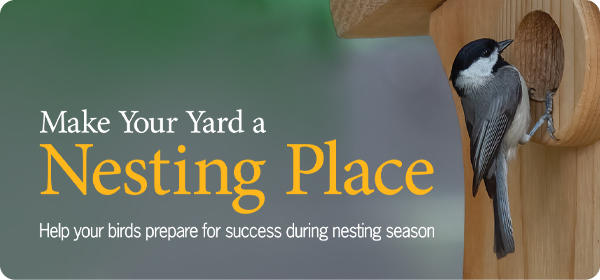Nesting Season

Birds need places to create nests and materials to build nests. Their nests are placed in many locations ranging from right on the ground to small bushes, trees and vines, to tall shade trees and large saguaro cactus. They make nests out of materials such as dried grass, twigs, sticks, mud, animal hair, moss, lichens, spider silk, plant fibers, feathers, and much more.
Bird houses provide nesting sites for birds that require a cavity in which to nest. Primary cavity nesting species (such as woodpeckers) excavate their own sites. Secondary cavity nesters rely on pre-existing cavities. Secondary nesters lack the ability to create their own nesting sites and will readily accept secondary housing.
Download Nesting Behavior Chart
There are three types of housing categories carried at our Wild Birds Unlimited shop. The first is considered functional; the second is functional decorative, and the third is for decorative use only. Our brick-and-mortar shop located at 2800 Broadway, Suite L, offers a wide selection to choose from, so don't hesitate to swing by!
Functional Houses
It is important that functional houses meet the criteria of the proper housing situation for birds. It is important that houses have the following characteristics:
- Ventilation: It is important for functional houses to have good ventilation. Panels of wood that are ¾ inches thick help provide insulation from the heat; recycled plastic should be at least ½” thick. Holes near the top of the house allow for the heat to escape.
- Easy Clean Out: A side panel that opens allows for easy clean out of the nest at the end of the season which helps to keep the pest population down. (The Wild Birds Unlimited houses allow for viewing or photographing of the birds without disturbing them by offering a top opening panel.)
- Adequate Drainage: Holes at the bottom corners allow for drainage. Drainage holes in the middle of the bottom will not adequately allow for drainage.
- Perches: Perches are not necessary and actually allow sparrows and other birds a place to sit and access the hole.
- Fledgling Ladder: It is a good idea (especially for bluebird houses) to provide either slashes or a ladder to help the fledglings leave the house.
Functional houses should fit the requirements for the kind of bird that is desired and should be mounted in a manner that is safe for that kind of bird. Learn more about our Nesting Boxes or visit our store in person at Wild Birds Unlimited Pearland to choose from a wider selection!
Decorative Functional Houses
Decorative functional houses are often painted or decorated. They should perform as basic houses for customers who wish to provide housing for the birds, but want a more decorative look for their yards. These are also used as decoration inside homes and offices. This category of houses may include houses that are decorated but do not necessarily fill all of the functional housing requirements. It is important for this category of houses to fulfill basic requirements such as ventilation, drainage, clean-out and basic size requirements.
Decorative Houses
Decorative houses are not functional houses. They do not meet enough of the requirements to be considered proper housing for birds. They should only be used as decoration for inside the home, office, etc. Decorative houses are great for nature lovers to bring a little bit of the outdoors inside.
Calcium
Calcium is the most challenging mineral for birds because when they need it, they need large quantities and they need it right away. This is mainly during nesting time for egg laying ans well as chick development. The amount of calcium in their natural diet of seeds and insects is often inadequate and they must seek calcium-rich foods as a supplement. Ask us about the many bird foods we offer which include calcium to help your nesting birds. Our source of calcium is from oyster grit or limestone dust. Both are finely ground and easily consumed by small songbirds.
Be a seasonally savvy friend to your birds by providing them with the extra calcium they require during nesting season.

